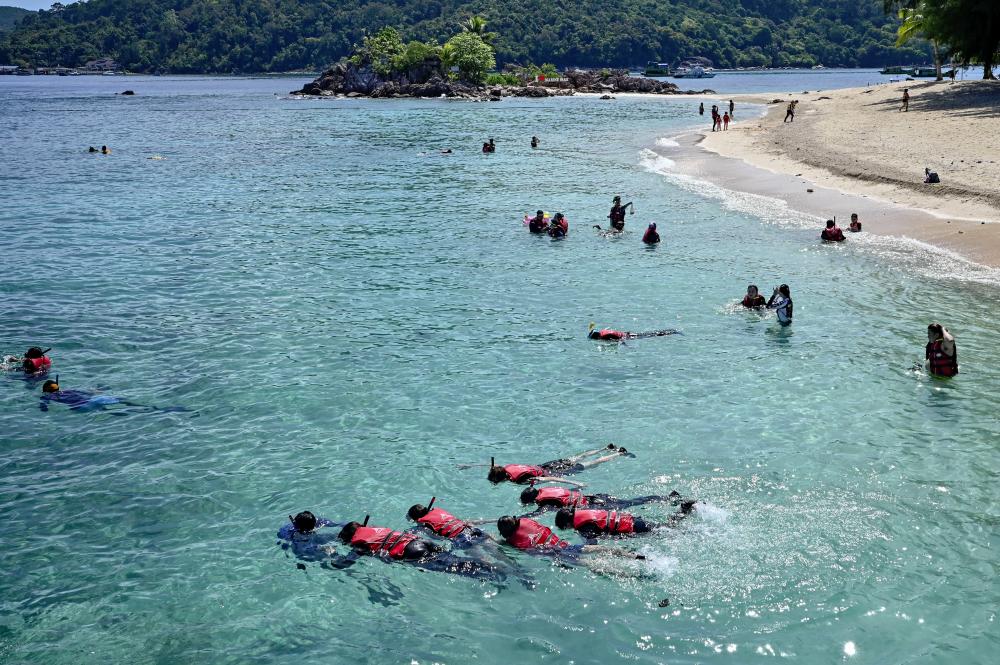PETALING JAYA: Seafarers and tourists have been warned not to go near or make contact with whales and other marine mammals that they encounter in open waters following a recent rare sighting near the holiday island of Pulau Redang.
Universiti Putra Malaysia department of biology, faculty of science senior lecturer Dr Wan Mohd Syazwan Wan Solahudin said it is important to maintain a safe distance in order to prevent stress and potential injury to the animals.
He was commenting on the sighting of a whale believed to be a humpback near Pulau Redang, which is about 45km off the coast of Terengganu, on Sept 14.
A video which has been widely circulated featured some people on a vessel shouting excitedly while venturing closer to the creature whose upper part could be seen above the water.
Wan Mohd Syazwan expressed concern that approaching or touching such animals may disrupt their natural behaviour.
“Pulau Redang is a popular tourism destination. The increased boat traffic poses a risk of collisions with the whales,” he told theSun.
He added that there is also a threat of entanglement in fishing nets and gear, which can be hazardous for the humpback whale.
“Chemical pollution from coastal developments and marine debris such as plastic pollution could adversely affect their health.”
He noted that sightings of whales are quite rare in Malaysia compared with other marine mammals.
However, there have been reports of Bryde’s whales near Langkawi, Omura’s whales in Sabah and Sei whales in the waters off Selangor, Pahang and Johor.
“As for humpback whales, sightings have been recorded in Perak and Sarawak. The recent sighting of a humpback near Pulau Redang could be the first, as far as I am aware.”
Wan Mohd Syazwan said the humpback whale came close to the island for several reasons.
“Changes in ocean currents or water temperature around Pulau Redang may have attracted the whale closer to shore in search of food.”
He said the relatively calm and warm waters there could provide a suitable resting spot during migration.
“Humpback whales are known for their long migrations between feeding grounds in colder waters and breeding grounds in warmer, tropical regions.
“Although Malaysia is not typically part of their usual migration route, it is possible this whale deviated slightly from its normal path, perhaps due to changing environmental conditions and shifts in water temperature,” he said.
He added that humpback whales prefer to give birth in shallow, warm waters commonly near reef systems or shores, and this could also be the case for the one seen near Pulau Redang.
“It is possible that whales have migrated from their feeding ground in colder, high-latitude waters such as the North Pacific or Southern Hemisphere, where they feed during the summer months, to the warmer, tropical waters like Malaysia’s, where they breed and give birth during the winter,” he said.
“The humpback whale, like other marine organisms in Malaysian waters, could be affected by the seasonal (monsoon) environmental changes.”
He said the Southwest Monsoon from May to September and Northeast Monsoon from November to March bring changes in sea conditions, wind patterns and currents.
“These shifts might affect the whale’s migratory route or encourage it to stay in calmer waters near the island. The seasonal environmental changes also can affect the availability of prey species like krill, small fish and plankton, which humpbacks feed on.
“If the waters around Pulau Redang are rich in these food sources, they could attract the whale to find their food in the area,” he said.
Wan Mohd Syazwan also cautioned that whales are protected in Malaysia under Section 27 of the Fisheries Act 1985, which states that they are not allowed to be fished, disturbed, touched, captured, killed or taken, and offenders face a fine not exceeding RM5,000.
He said people who spot whales should report the sighting immediately to local authorities, such as the Fisheries Department at 03-8870 4426 and other active NGOs such as the MareCet, which actively conduct marine mammal research and conservation efforts throughout Malaysian waters.









